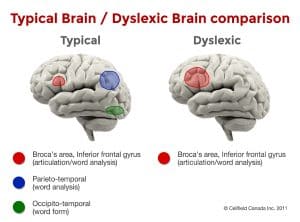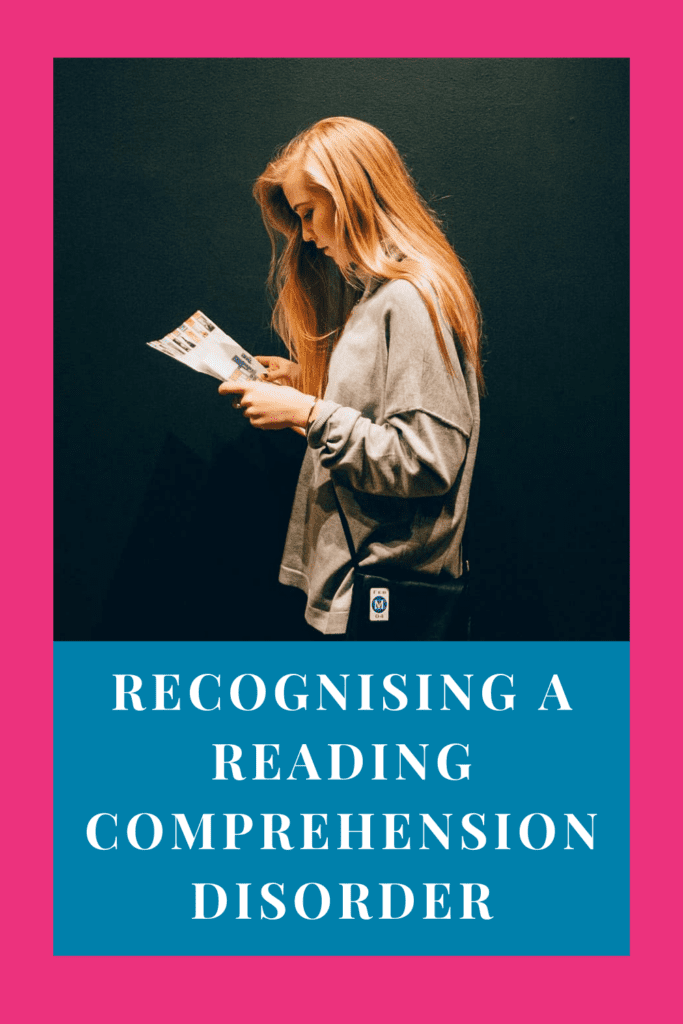Let me tell you about Julie – a bright 14-year-old girl.
She has always had a hard time with reading, but has always been able to get by with C’s – until grade 6. The more that she had to read in order to learn the worse her marks became. Julie can ‘read’ but she finds she just can’t seem to remember much from the text.
Now she is in high school and her mother is desperate to find out why Julie has such poor comprehension despite years of tutoring.
The Reading Disorder You Don’t Know About
The process of decoding that involves matching sounds to symbols and blending sounds to form words is one part of reading. Comprehension is another.
Many individuals with reading disorders can decode. They can possibly read a sentence like nobody’s business, but they have a moderate to severe inability with reading comprehension.
These kids might not be ‘true dyslexics‘. They may not have difficulties with reversals or phonemic awareness. They may have a reading comprehension disorder.
Specific Reading Comprehension Deficit
Kids with a reading comprehension disorder are unable to recall specific details of the text. They may have some level of comprehension but the sequence is incorrect and the information is misconstrued.
This is called Specific Reading Comprehension Deficit (S-RCD). Parents and even teachers can make the mistake of assuming their child is a good reader because when they read aloud, they can decode fluently. When decoding is strong, but comprehension is weak, it’s common to write the child off as a weak reader who ‘just needs more practice.’
Despite providing extra help, practice and even tutoring, reading continues to be labourious. As children move from grade 3 and into grade 4 they are no longer learning to read; they are reading to learn.
By high school, it is almost impossible to learn the subject content when there are deficits with reading comprehension.
The Kid Who is Brushed Off as a ‘Weak Reader’
This is when parents seek my services. The student is about to start high school or already has. Parents tell me their child has always been a ‘weak reader’. They say that he has always struggled but managed to ‘get by’.
The child might been tested for dyslexia and was told everything is fine. Parents may have wanted to have their child tested but they couldn’t get the school to fund it because it wasn’t considered serious enough.
Up to 10% of children have this disorder to varying degrees. If the disorder is caught, it’s often not until grade 4, often much later, if at all. At this point the difficulties with comprehension are affecting the child’s self-esteem, their experience of school and their relationship to reading.
How Self-Esteem is Affected
Poor reading comprehension hinders their ability to learn in all subjects whether that be math class or history. These are the kids who might be disruptive in class because reading is ‘pointless’. They are bored and may even hate school.
By grade 6 and definitely by grade 8, the amount of reading in order to understand and learn the subject content has become overwhelming. Marks are taking a nose dive.
School is even more appealing with the onset of puberty and all the other more appealing interests of friendship and social media that come at that age. Parents have noted their child ‘just doesn’t care about school.’
I can’t say I blame them. What kid at that age is going to keep slugging away at something that is clearly bringing them nothing but feelings of failure? This is an age when finding one’s place within their peer group is at the forefront of the mind. This is an age in which their self-esteem is fragile.
Self-Preservation is not Laziness!
And yet, we expect them to stay motivated, to keep trying when they are failing. It is not laziness that causes these tweens and teens to shut down. It is human instinct. It is self-preservation.
Their shutting down is recognizing that this mountain has been impossible to climb for the last decade and it’s not going to be any easier today. So why bother? Who would?
It is frustrating beyond belief to be able to do a math problem effortlessly. Yet, they are unable to complete a word problem – not because the math is difficult, but because the reading makes it impossible navigate the math.
How is S-RCD Different from Dyslexia?
When tested for spatial memory and planning, children with S-RCD scored significantly lower than dyslexics while the S-RCD children performed at a normal level on word cognition.
It’s only recently that a five-year study at Vanderbilt’s Peabody College and John Hopkins School of Medicine allowed researchers to specifically be able to identify hard proof of the neurology behind this disorder. While dyslexic children have weaknesses in the occipital-temporal areas of the brain, children with S-RCD had weak connections and activity in the area of the brain linked to memory.
 Ensuring that children with S-RCD are decoding using strategies that fluent readers use is the first step. Children can develop compensations that allows them to read fluently, but have essentially resulted in them being a ‘false fluent reader’.
Ensuring that children with S-RCD are decoding using strategies that fluent readers use is the first step. Children can develop compensations that allows them to read fluently, but have essentially resulted in them being a ‘false fluent reader’.
What Can Go Wrong?
Fluent readers read from the left side of their brain where the language centre is. It’s not unusual for individuals with S-RCD to also have dyslexia.. In this case they are still reading from the right side of the brain (where we start reading). This makes reading much more laborious. They are using their working memory to decode making it unavailable for comprehension.
In other instances, when dyslexia is not present, they are reading from the left side of the brain. The problem in this instance is that the memory centre is weak or seriously lacking sufficient connections thereby making comprehension a daily struggle.
Why Tutoring Fails & Brain-Training is Needed
No amount of practice or tutoring will improve comprehension until your child does cognitive therapy or brain training to improve working memory. The first step is to strengthen weak areas like the centre responsible for memory, attention and sequencing.
The next step is to re-enforce those new connections and to automatise the processes like memory that are necessary for skilled reading through exercises that are challenging but fun as well as rewarding. Improving motivation is key to restoring the natural drive to learn and succeed.
Reading Rockstar Bootcamp offers one-on-one learning therapies that targets the underlying reason why learning or reading is so hard for your child. Think of me as a personal trainer for your child’s brain.
Set up a free 20-minute discovery session to learn more about how you can help your child improve their reading comprehension so they can become a fluent reader and a more confident kid.


